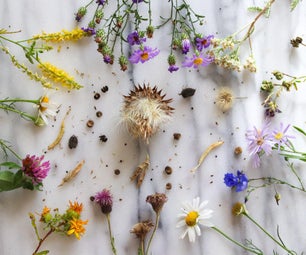Introduction: How to Make the Most of Your Garden Space and Grow More Vegetables
Whether your garden area is 10 square feet or 1000, chances are there's more you'd like to plant than you have room for. This Instructable will give you tips to increase your growing capacity without spending a lot of money.
Step 1: Grow UP!
Plant squash, bean and cucumber varieties that vine (not bush varieties). Plant these on a trellis (in the case of cukes and squashes) or, in the case of pole beans, up a bean teepee. A teepee can be made of any long, slender poles (I used furring strips I found in my garage, and tied them together with zip strips). For pole beans, the teepee should be at least 5' tall. You can use fencing as a trellis as well, whether it's chain link, chicken wire, welder wire, or whatever you have. Plants might need a little guidance to know where to grow, just be sure to treat them gently so you don't break the stems.
Step 2: Grow Up With a Potato Tower
One space-saving way to grow potatoes is with a potato tower. Here's how it works:
Make a tube of fencing (as seen below), or out of a trash can with the bottom cut off. Plant your potatoes as you would normally, but more densely (5-10, depending on diameter) in an area the size of your tube. As your potatoes grow, add alternating layers of straw and compost, leaving about 6" of leaves exposed at all times. At the end of the growing season, when the plant leaves start to die back, you can kick over the tower and pull out your harvest of potatoes.
Step 3: Think Inside the Box.
Think creatively about container gardening. Sure, you can plant tomatoes in pots, but what about carrots or kohlrabi? Certain veggies, like carrots, can be planted relatively close together. Use varieties that do best in containers. Your extension service will be bale to help you find varieties that do best in your area http://www.csrees.usda.gov/Extension/index.html. Just make sure the container is deep enough--24"-30" is ideal. We built these planter boxes out of cedar fence planks for about $6 each.
Also consider using hanging baskets for vegetable plants.
As with all container gardening, be sure to water and fertilize plants more often than you would in your main garden.
Step 4: Find Nooks and Crannies.
Think about your priorities. Do you have little areas that now have gravel, flowers, or things you just don't care about? Consider turning these into growing areas.
Smaller, contained beds are especially good for plants that have a tendency to spread like mad. I planted these invasive horseradish plants in a narrow bed next to my house. If you love garlic, squeeze a few plants between your perennials. You'll be suprised where you find space.
Step 5: Let Your Squash, Cukes and Melons Roam.
Plant squash, cucumbers and melons next to areas where then can spread. It might be along the back of a shed or into the lawn. Sure, having vines growing through a corner of your hard might make mowing a challenge, but what tastes better, squash or grass? Likewise, you could allow vines to grow onto your patio or balcony.
Participated in the
Get in the Garden Contest









